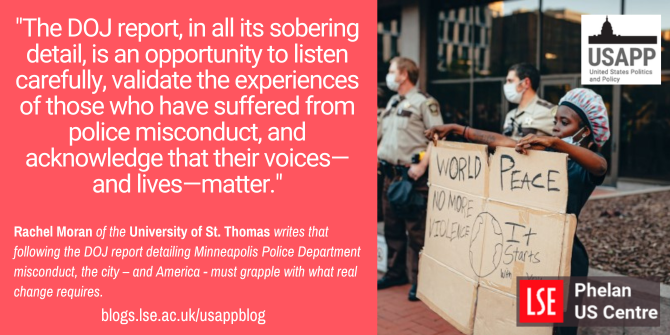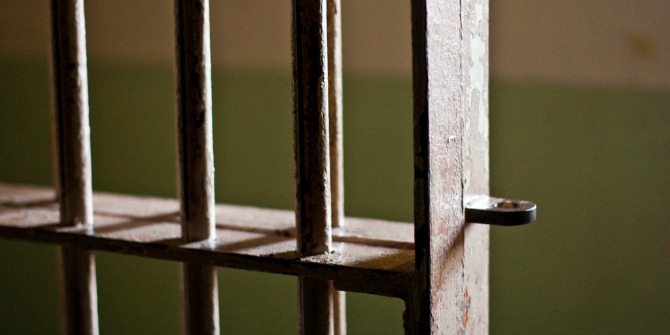 After more than two years of investigations following the murder of George Floyd, the US Department of Justice recently released its report on the Minneapolis Police Department, finding that it systematically violates its constituents’ civil rights. Rachel Moran writes that rather than pivoting immediately to the positive changes to policing that have been implemented since 2020, Minneapolis residents and Americans across the country should respond to the report by listening to the negative experiences of communities of color around policing, reckoning with their own roles in creating racial disparities that impact policing, and committing to meaningful change.
After more than two years of investigations following the murder of George Floyd, the US Department of Justice recently released its report on the Minneapolis Police Department, finding that it systematically violates its constituents’ civil rights. Rachel Moran writes that rather than pivoting immediately to the positive changes to policing that have been implemented since 2020, Minneapolis residents and Americans across the country should respond to the report by listening to the negative experiences of communities of color around policing, reckoning with their own roles in creating racial disparities that impact policing, and committing to meaningful change.
On June 16th, the US Department of Justice issued its long-awaited report on the DOJ’s investigation into whether the Minneapolis Police Department systematically violates its constituents’ civil rights. The investigation, which was announced the day after Derek Chauvin’s conviction for murdering George Floyd and lasted more than two years, found that the City of Minneapolis regularly violates civilians’ rights in four major ways: (1) officers use excessive force; (2) officers discriminate against Black and Native American people when enforcing the law; (3) officers flout the First Amendment, especially in the context of protests and attempts to record police; and (4) both the City and the police department respond inappropriately to people with behavioral health disabilities.
The DOJ report keeps police misconduct in focus
As a policing scholar in and resident of Minneapolis, I found the report sad but unsurprising. Perhaps no police department in the country has been scrutinized as heavily as the Minneapolis Police Department over the past three years, and a separate investigation by the Minnesota Department of Human Rights also found substantial evidence of racial discrimination by Minneapolis police officers. To their credit, Minneapolis leaders including Mayor Jacob Frey and Police Chief Brian O’Hara (who was hired in November of 2022 largely because of his experience with reforms in the Newark Police Department) have publicly embraced the DOJ’s findings and already changed some departmental policies. Hundreds of Minneapolis police officers have also resigned since 2020, and the department is working to recruit city residents with a different mentality toward policing.
Some politicians and Minneapolis residents who haven’t directly experienced police abuses want to move on from talking about police misconduct and gloss over the findings in the DOJ’s report. I sense that same tendency in many other cities, especially from white people who felt a surge of concern for police misconduct during the summer of 2020 but are now eager to focus on other matters. I understand the desire to focus on positive changes to policing, and the weariness that comes with repeated public criticism, particularly for those officers who actually are doing decent work under hard circumstances. But we cannot afford to simply move on. Instead, I urge both Minneapolis residents and Americans across the country to respond to the DOJ report in three ways.

Photo by Josh Hild on Unsplash
Three ways Americans can respond to the DOJ report
First, we must listen. Both the DOJ and the Minnesota Department of Human Rights found significant evidence of racial discrimination against Black and Native American residents in many aspects of policing, ranging from traffic stops to use of force to sheer disrespect in the way police officers treat city residents. As just one example, the DOJ found that between 2016-2022 Minneapolis police officers used neck restraints—the very tactic Derek Chauvin used when he murdered George Floyd—“on Black and Native American people at per capita rates that were 9.6 and 12.2 times the rate for white people, respectively.” Communities of color have been voicing these concerns for years, and as a city and country we have not listened well enough. The DOJ report, in all its sobering detail, is an opportunity to listen carefully, validate the experiences of those who have suffered from police misconduct, and acknowledge that their voices—and lives—matter.
Second, we must reckon with our own roles. Tempting as it may be to blame police officers entirely for abuses in law enforcement, their policies and actions are often the product of broader societal ills. By no means am I exonerating officers who committed some of the egregious abuses detailed in the DOJ’s report, nor the supervisors who shrugged at those abuses. But the DOJ also found that the city’s accountability systems for addressing police misconduct were “fundamentally flawed,” and the state Department of Human Rights investigation concluded that city officials’ and county attorneys’ processes for tracking information about officer misconduct were “woefully lacking.” Lawyers, judges, and politicians bear significant responsibility for creating legal systems that enable unaccountable police. Mortgage lenders and realtors have played a role in funneling people of color into higher crime neighborhoods that tend to be more heavily and poorly policed. Almost every profession has contributed in some way to racial disparities that impact where police officers are deployed and how they operate. Yes, the Minneapolis Police Department must change—dramatically—but so must society.
Third, we must repent. That word, often used in a religious context when discussing individual behavioral changes, may seem out of place when talking about the responsibilities of governmental entities and society collectively. But repent means simply to turn away from wrongdoing and dedicate oneself to change. I can think of few definitions more appropriate for responding to such a detailed report of systemic policing abuses. Minneapolis—and many other cities—have experienced policing scandals before, and too often responded with superficial reforms. The question is, are we committed this time to meaningful change? I am among the first to admit that providing equitable public safety services is not easy or always clear-cut. But as the DOJ report chillingly declared, “the systemic problems in MPD made what happened to George Floyd possible.” Mr. Floyd, and the many other individuals and families who continue to experience the traumas of police misconduct, deserve a country that will dedicate itself to lasting change.
- Please read our comments policy before commenting.
- Note: This article gives the views of the author, and not the position of USAPP – American Politics and Policy, nor the London School of Economics.
- Shortened URL for this post: https://bit.ly/435bmGq






